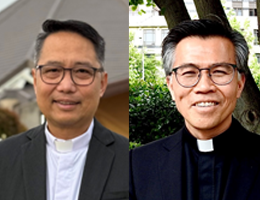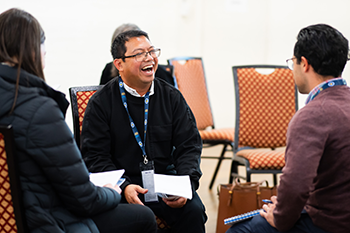By Fr Khalid Marogi
Miriam-Rose Ungunmerr-Baumann AM, Senior Australian of the Year in 2021, gave the Australian Church a special gift. She helped us to appreciate and learn from the Aboriginal practice of deep listening – dadirri. It is a spiritual skill, an inner, quiet awareness, a posture of waiting, which is available to everyone. She says, in essence, we have been listening to your way; now is the time to listen to our way.[1]
 So how can we use this gift, at this time, in the Australian Church? How might we practice a more synodal way of being Church, as promoted by Pope Francis? One area for growth is our relationships with the increasing number of multicultural clergy. This reality looks different everywhere in the country; there are a vast range of experiences. For example, we recently welcomed a new Cardinal – Bishop Mykola Bychok – and two new Bishops – Thinh Nguyen and Rene Ramirez RCJ – who were born elsewhere but have made Australia home.
So how can we use this gift, at this time, in the Australian Church? How might we practice a more synodal way of being Church, as promoted by Pope Francis? One area for growth is our relationships with the increasing number of multicultural clergy. This reality looks different everywhere in the country; there are a vast range of experiences. For example, we recently welcomed a new Cardinal – Bishop Mykola Bychok – and two new Bishops – Thinh Nguyen and Rene Ramirez RCJ – who were born elsewhere but have made Australia home.
However, among missionary (overseas-born) priests, there are also experiences of challenge, remnants of a colonial mentality and scapegoating. As a mild example, a friend used to say, “The people of my diocese don’t understand the overseas-born clergy, but they love them”. Perhaps this is the opportune time to try to understand. This is the time to tune our skills of dadirri and listen with the ears of our heart.
Let us begin by tracing some of our history. The early Australian Catholic Church was characterised by its Irish heritage until the 1940s. After World War II, the Catholic Church embraced the new multicultural identity, which came with the influx of non-Irish Catholic migrants. This became evident in the pews and the diverse backgrounds of new clergy. By 2021, the Australian Census recorded that 28 per cent of the Catholic population of almost 5.1 million were born overseas[2]. The multicultural identity of today's Australian Catholic Church is enriched by the culture, the spirituality of the Aboriginal and Torres Strait Islander Peoples and their intimate connection to the land and water.[3]
During the past 30 years, the Australian Catholic Church has received a large number of generous missionary clergy and religious sisters and brothers from all over the world. These missionaries, with good hearts, left their families, cultures and countries to come and faithfully serve the Church in Australia. Their contribution is felt all over the country, from the most isolated and remote communities to parishes in urban cities. Their presence in our local parishes and many other ministries, like hospital and prison chaplaincy, is enriching the Catholic faith and helping the Church to celebrate this new phenomenon as a way to foster solidarity and compassion, to embrace diversity and to promote inclusion.
The ministry of welcome is a key element that initiates conversations and leads to the transformation of the different individuals who enter into the dialogue. Both the welcomer and the welcomed are enriched by the experience. When we enlarge our tents, it is not just a sign of welcome, but also a recognition that we are fortunate to have more people who bring the riches of their presence and gifts to the table. The ministry of welcome and hospitality is a two-way ministry. In Pope Francis’ words, “Those who show hospitality grow richer, not poorer. Whoever gives, receives in return.”[4]
Hospitality is also a core practice highlighted in Scripture. Abraham’s hospitality to his three visitors became a source of joy for him and his wife, Sarah: “Then his guest said, ‘I shall come back to you next year, and your wife Sarah will have a son.’ Sarah was listening at the entrance of the tent behind him,” (Genesis 18:10). Although Sarah and Abraham were amused by this great news, which caused Sarah to laugh in disbelief, the visitors affirmed the news: “Nothing is impossible for the Lord” (Genesis 18:13). Sarah would have a child who would bring joy and happiness to her and Abraham, affirming God’s promise to journey with God’s people.
In the New Testament, the hospitality and welcome of Martha and Mary to Jesus at their house established a deep friendship and openness to listen to the word and teaching of Jesus (Luke 10:38-42). The same can be said about Zacchaeus’ welcome to Jesus at his house, which gave him a new perspective, helping him to see more clearly and opening his heart to restructure his relationships with his sisters and brothers (Luke 19:1-10).
 Finally, in contemporary reflection, theologian Karl Rahner emphasises that love and hospitality in a parish community must be practical. This everyday welcome and kindness makes the community’s celebration of God’s tenderness and acceptance a space where each and every one feels loved and a sense of belonging. The parish must be an inclusive community that is hospitable, welcoming, and providing a common home for all.[5]
Finally, in contemporary reflection, theologian Karl Rahner emphasises that love and hospitality in a parish community must be practical. This everyday welcome and kindness makes the community’s celebration of God’s tenderness and acceptance a space where each and every one feels loved and a sense of belonging. The parish must be an inclusive community that is hospitable, welcoming, and providing a common home for all.[5]
Therefore, rather than seeing our missionary clergy as a problem to be dealt with, we should celebrate their presence. We should be able to say confidently that the Australian Catholic Church is graced by migration and that welcoming others, including missionary clergy and religious, has always been our strength.
This is also not the prerogative of the Church hierarchy only; as we grow in co-responsibility, it applies to all of God’s faithful. Everyone has the power and duty to build a culture of welcome in our parish communities for new members or clergy and religious from other countries. It is a journey that requires an honest assessment of our colonial history and ongoing challenges. The conversation depends on deep listening, learning and developing trust. Inter-culturation means giving space to people to be themselves, so they can perform to their best abilities.
However, this hard work produces wonderful results. It allows parishes to embrace new opportunities, according to their openness to become a new people, a new community. Rather than focussing on the differences between us, we can use these differences to enrich each other. Embracing the fact that we are multicultural will help the Australian Catholic Church to grow in faith and mission. Let us open the ears of our hearts to each other and celebrate our diversity as our God-given strength.
*Fr Khalid Marogi is a Chaldean priest who is currently serving as the national director of the Australian Catholic Migrant and Refugee Office.
Images: Bishops-elect Fr Rene Ramirez RCJ and Fr Thinh Nguyen (Photo: Archdiocese of Melbourne); Fr Harold Camonias from the Diocese of Port Pirie at the Evangelise Conference in 2024 (Photo: Ryan Macalandag)
Links
Global Clergy, Local Missionaries (Evangelise Plus)
[1] https://www.miriamrosefoundation.org.au/dadirri/
[2] https://www.catholic.au/s/article/Statistics
[3] In the 2023–2024 ACBC Social Justice Statement, Australia’s Catholic bishops have called on the nation to seek “a new engagement” with Aboriginal and Torres Strait Islander Peoples.
[4] https://www.vaticannews.va/en/pope/news/2020-01/pope-to-finnish-ecumenical-delegation-standing-together.html
[5] Karl Rahner, The New Image of the Church, Theological Investigations X, trans. David Bourke. New York: Seabury Press, 1977.



